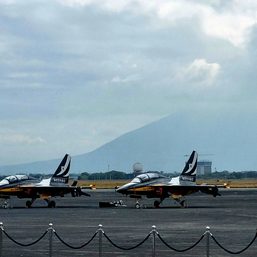SUMMARY
This is AI generated summarization, which may have errors. For context, always refer to the full article.
![[OPINION] Books, not guns: Military conscription is the last thing young adults need](https://www.rappler.com/tachyon/2022/07/thought-leaders-conscription.jpg)
Earlier this year, then-vice presidential candidate Sara Duterte – a colonel in the Philippine Army – declared her intention to reintroduce compulsory military service for all Filipinos once they reach the age of 18. More recently, she publicly voiced this desire to be prioritized in the new government’s legislative agenda.
In the middle of a pandemic, with millions of Filipino families crushed by skyrocketing prices, food shortages, and lack of jobs, it’s unclear how learning how to march in unison under the insufferable tropical sun will be of any help, notwithstanding claims of inculcating young adults with some vague notion of “patriotism.”
I should know. I’m a labor economist, and part of my dissertation was about the impact of compulsory military service on labor-market outcomes – such as lifetime earnings and wages – and educational attainment.
Only a handful of countries actively enforce conscription over most of its population. Many of these face an existential threat from neighbors, such as South Korea, Israel, and Taiwan. The world’s most powerful and technologically advanced military – the US Armed Forces – relies on voluntary service, as does (de facto) the Chinese People’s Liberation Army, the world’s largest standing army.

How might conscription benefit veterans in the civilian labor market?
Skills acquired while serving in the military can be useful outside the armed forces. In 2006, for example, 54 pilots in the Philippine Air Force resigned to work for commercial airlines. I don’t expect 18-year-old conscripts to learn how to fly a plane, but there are other skills – such as working in teams and following orders within a hierarchy – which the military demands and are also rewarded in a private company.
But if these purported benefits are so huge, why aren’t there thousands of volunteers banging at the gates of Camp General Emilio Aguinaldo to sign up for basic training?
The answer is obvious: the expected costs of military service outweigh the expected benefits.
Setting aside the issues of corruption and abuse – including the infamous murder of University of Santo Tomas student Mark Chua – there are significant costs that come with conscription.
Mandatory military service reduces a person’s civilian labor-market experience, which, in turn, adversely impacts their potential wage. Primary and secondary education already introduces valuable skills, but some of these lay dormant in the military, leading to their depreciation.
But the biggest cost of military service is what economists call its “opportunity cost” – the loss of civilian earnings had these conscripts entered the labor market earlier instead of being drafted.
Suppose you could earn P570 per day, the minimum non-agriculture wage in Metro Manila. In the University of the Philippines, there are 32 weeks in each academic year, and let’s say you’re required to undergo military training every Sunday for two years while enrolled (as I did back in the day). Forgoing those working Sundays to march instead in the UP Sunken Garden would mean a loss of P36,480 – not an insignificant amount when gasoline is about P90 per liter.
Since there are potential benefits and costs, whether conscription improves or penalizes a veteran is ultimately an empirical question – one that must be addressed with data. But it’s not as easy as comparing the earnings of veterans against non-veterans.
For one, military service requires passing a physical and mental health fitness threshold. If we expect healthy people to earn more (and they do), it would be wrong to say that the observed earnings differential between those who served and those who didn’t is because of military service alone.
Fortunately, economists have developed tools to solve this problem of “selection bias” – that is, people with higher earnings potential are selected or deemed fit for service more than those without.
In my own study of peacetime conscription in Germany, I showed that earnings are not different between those who served and those who didn’t when accounting for selection. But in the Netherlands, conscripts earn about 5% less per year. That may not seem a lot – until you project that over the average number of years of work.
But these averages mask the benefits (or costs) to certain groups. In Portugal, less educated men benefit from conscription while their more endowed counterparts were unaffected.
Does this mean we should draft the poorly educated? Certainly not.
If part of the goal of military service is to impart valuable life skills, there are better, more efficient ways to do it.
Instead of allocating resources to set up national military conscription – an undertaking that the previous defense secretary said would face “huge hurdles” – the government can instead invest in productivity-enhancing sectors, especially education, which the Vice President leads.
There is much to be done to improve schooling quality. The money to run national conscription can instead be funneled to technical and vocational training to ensure Filipinos are equipped with the necessary skills to succeed in the 21st century labor market.
Meanwhile, the government can revisit the compensation policy of the Philippine Armed Forces to ensure that it attracts and retains the best professional armed forces it can to safeguard our national security.
All of these can be achieved while preserving the important separation between military and civilian institutions, where the latter remains supreme. – Rappler.com
Alfredo R. Paloyo is an Associate Professor of Economics at the University of Wollongong, and an alumnus of the University of the Philippines School of Economics. He contributes to evidence-based policymaking on human-capital issues, particularly in the fields of labor, education, and health economics. He tweets at @AlfredoPaloyo.
Add a comment
How does this make you feel?



















![[Rappler’s Best] Knowing when to leave](https://www.rappler.com/tachyon/2024/07/biden-sara-gfx.jpg?resize=257%2C257&crop_strategy=attention)
There are no comments yet. Add your comment to start the conversation.